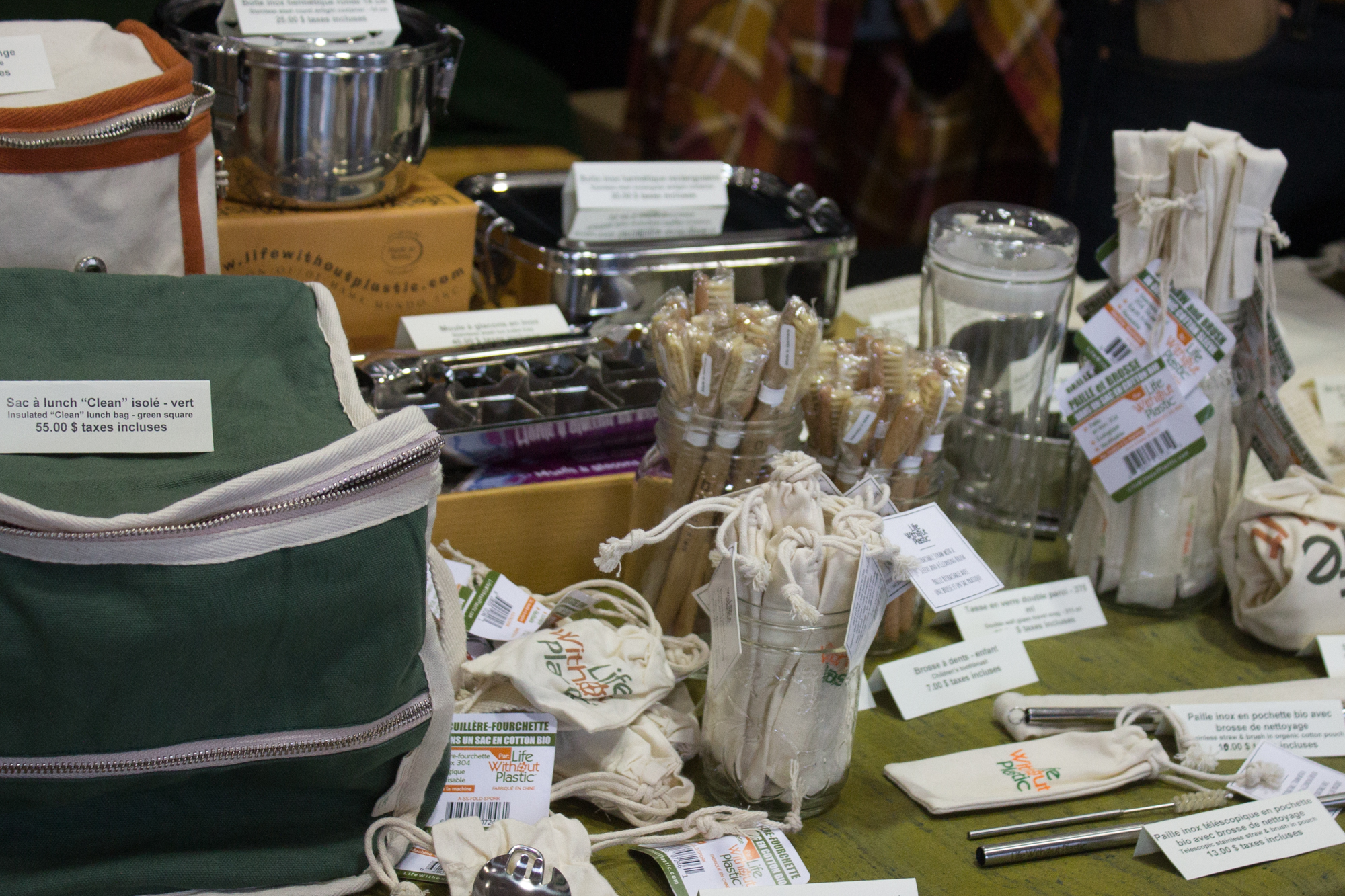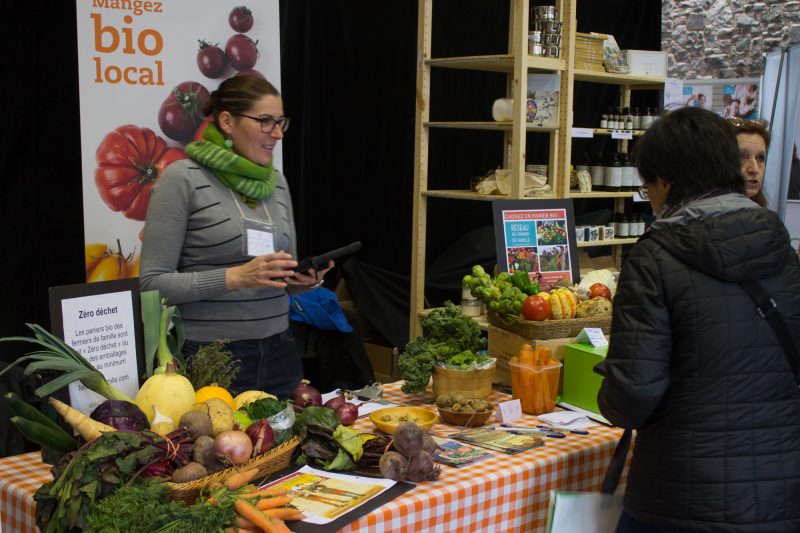The third annual Montreal Zero Waste festival took place at Marché Bonsecours in Old Montreal, from Nov. 8-10.
Held by the Association québécoise Zéro Déchet (AQZD)- who aims to sensitize and inspire citizens, governments, enterprises and organizations to become aware of the benefits of developing a zero waste lifestyle-the festival explored sustainable consumption, ecology, and composting among other eco-conscious themes.
With 14,000 expected visitors, up from the 7,000 attendees in 2017, the festival featured around 90 exhibitors, from hygiene products, to fashion, services and home goods. Over 90 per cent are Quebec-based initiatives.
“When [Life Without Plastic] started out, it was very difficult to get people’s attention regarding zero waste and zero plastic because people thought that all of the products they put in the recycling were, in fact, recycled,” said Chantal Plamondon, co-founder and president of Life Without Plastic. The company is a zero waste brand aiming to eliminate plastic use from everyday life by offering entirely compostable products.

“It’s only recently that people have started to realize that there is plastic everywhere, and that garbage finds itself in the ocean,” said Plamondon. “Now, there is an increased conscientiousness around Montreal, for the past three-four years, around plastic and garbage waste and consumption.”
While the idea of a zero waste lifestyle was very niche a few years ago, it is now making its way to a larger portion of the population. Solid shampoo and conditioner bars were mass popularized due to Lush Cosmetics’s surge in recognition. Bamboo toothbrushes and solid deodorants are also slowly making their way into pharmacies, and institutions are opting out of selling plastic water bottles, such as McGill.
“You don’t expect that we produce so many beautiful, quality items here [in Quebec],” said Coralie, a returning visitor who chose not to give her last name. “It’s so easy to just go to WalMart and everything is cheap, but it’s not a conscious purchase. Here, you can slowly take steps towards a more simple way of life.”
However, Plamondon noted the superficiality that lies within the green industry. “People get very swayed by marketing, they will think ‘oh, look a bamboo toothbrush’ because the packaging says ‘organic’ and ‘zero waste.’ But if the bristles are made of nylon, it’s not compostable,” she said. “The good thing is, people are aware of the problem and they are looking for a solution, they just need to dig a little further and see what they are actually buying.”
In fact, the sudden surge in adopting a zero waste lifestyle, and the conscientiousness that comes with this, has incited many to make their own products. This can help minimize their ecological footprint as much as possible and be certain of what exactly they are consuming.

“Seeing all the products gives you ideas; there are so many things you can make yourself,” said Audrey-Anne Pouliot, who attended the festival for the first time after a friend’s recommendation.
“I’m trying to change my lifestyle and the way I consume things,” said Philomène Dévé, another festival goer. “I purchased a lot of things to help me make my own products.” She noted that the climate march was, in fact, a driving factor towards her changing her lifestyle.
An estimated 500,000 people attended the Sept. 27 climate march, a 900 per cent increase from the 50,000 who attended Nov. 10, 2018, according to statistics from La planète s’invite au parlement, an independent coalition fighting for climate justice and one of the climate march organizers.
Moreover, with the Concordia University Foundation announcing its intention to withdraw all of its investments from the coal, oil and gas sector before 2025 earlier this week, it is becoming more apparent that key players in Montreal are increasingly invested in fighting for the climate and adopting sustainable practices.
From 2018 to 2019, there was a 9 per cent increase in the implementation of food waste collection in the city, bringing the total up to 540,000 units offering composting services, bringing hope for the future of waste elimination and zero waste initiatives in the Greater Montreal Area.
“This sensitivity for the environment really increased in the past few months,” said Dévé. “Especially with all the infatuation for the climate march, and it made me think that I was buying way too much and this buying pattern didn’t correspond with my true values.”
But the problem does not lie solely in the hands of the consumer, nor does the solution. While the environment and sustainability have definitely become a trend within the past year, it is important to remember that, with a movement comes infatuation and, ultimately, people who are trying to make money.
“Manufacturers must involve themselves, because they are currently exporting the price of plastic; they make the product without asking themselves what will happen to the waste, thinking that it’s not their problem,” said Plamondon. “As consumers, we have to inform manufacturers and give them incentives; we have to let our favourite brands know that we want them to make more effort in regards to waste production and packaging.”
When it comes to food, clothes and transportation, being mindful of what one is purchasing and how much one is consuming is a good mindset to have. In fact, the Global Footprint Calculator allows for you to calculate your personal ecological footprint based on factors such as how much meat you consume, the distance you travel daily and your electricity consumption.
“The way that we are currently living is not viable, so this type of festival is really good to initiate everyone and introduce them to a new way of living,” said Dévé.
While adopting a zero waste lifestyle is one aspect towards a waste-free future, it is not the only thing you can do. Eating less meat, shopping second-hand and supporting local businesses is a great place to start.
“I think there is a certain path [towards a waste-free future] that has been made that is irreversible,” said Plamondon. “I think it is durable, I have hope.”
“It’s one small step at a time,” said Coralie. “To simplify life.”
For more information about the Association québécoise Zéro Déchet and how to get involved you can visit their website at https://www.aqzd.ca/. Calculate your global ecological footprint at https://www.footprintcalculator.org/.
Photos by Brittany Clarke
Video by Calvin Cashen




